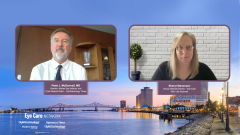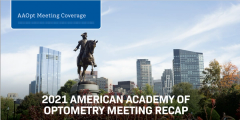
Dr. McDonnell shares advice for first-time attendees on how to enjoy AAO 2021 to the fullest
Episodes in this series

Ophthalmology Times’® Sheryl Stevenson speaks with Peter J. McDonnell, MD, chief medical editor, on advice for first-time attendees of the 2021 annual American Academy of Ophthalmology meeting and how to enjoy both the meeting and venue to the fullest.
Sheryl Stevenson: Obviously with all the recent FDA approvals that have happened, I know ophthalmologists have been eagerly looking forward to these advancements throughout the year. I imagine that would be quite a bit of the conversation—or focus of conversation—and presentations that are taking place there.
Peter J. McDonnell, MD: Yeah. Just like all those great New Orleans restaurants, there's too many food items for anyone. Although, I'm a big eater; maybe I could eat them all. But, this year, as you pointed out, the new approvals, I think artificial intelligence is something that's gone from pretty much off the radar a few years ago to now I think we can all see how we're going to be employing that to change how we practice in the coming, not too distant, future. Using AI to do things like diabetic screening exams so we don't have to, and we'll just see the patients that need us to treat them in more and more fields. And as you pointed out, just ophthalmology is a field where we embrace innovation. And this is a really great opportunity to hear about the new innovative treatments, both from our fellow ophthalmology, from the podium, but then also to go to the exhibitors and perhaps get samples or get some additional information and take that back to our practices the following week.
Stevenson: And the exhibit hall itself is very expansive. It’s a really great opportunity to see a lot of these in-person and maybe sample them or try them out or learn more about them as well.
Dr. McDonnell: One of my colleagues when I was young, I guess [we were] still residents, he said, "Holy cow, this is a candy store for ophthalmologist." That exhibit hall. And it is, and there are all these nice representatives from industry eager to tell us about what their products are and the potential advantages for our patients. So it's a great way to do it all under one roof and very efficient way to comparison shop and see what the different providers have to offer us ophthalmologists. So, it's a great service in a way the academy serves by putting it all together and allows us to use our time much more efficiently.
Stevenson: And you mentioned the residents as well. Kind of talk us through that through the eyes of the resident—how this meeting might appear to them or how they might experience such a meeting.
Dr. McDonnell: Well as you can tell Sheryl, it's been many, many years since I was a resident. But I still remember as a, maybe I guess a second-year resident going to my first academy meeting and almost being overwhelmed, trying to learn all the things. I naively thought I could attend every session. And the exhibit hall was really overwhelming to see and learn about all the different things. But I found that even just as a resident, I found that people treated me respectfully and as a future colleague and maybe the industry people treated me respectfully to encourage me to be a future customer because as a resident, I obviously wasn't making purchasing decisions; I was just there to learn. But everyone, everyone treated me— a resident, a nobody—very positive, [in a] respectful way. And I really thought it was quite [an] impressive experience, and I've always been very proud of our American Academy of Ophthalmology. They really organize things well, very professionally, and they strike that appropriate balance between sharing information. That's very high-quality, peer-reviewed information and allowing us access to the exhibitors to industry and not confusing what's science versus promotion. I think the academy has really represented our profession well in that regard.
Stevenson: Okay. And then obviously while in New Orleans, there should be opportunity to sample some of the foods and other food and beverages there. So from your previous experience, what are some examples or some recommendations of places that people might want to go to or sites to see?
Dr. McDonnell: Yeah, when they put out where the Academy's going to be in future years, every time I see New Orleans listed there my stomach starts to rumble because I just love that Cajun food, the blackened red fish, all that kind of stuff that, fortunately, I've never had a sensitive stomach, but I love the Cajun food. I love sort of the, I think of as sort of French cuisine. In growing up in New Jersey, we had fantastic Italian food, but not the kind of food that I like to try when I go to New Orleans. So definitely want to do that. I don't want to name any particular restaurants there and be accused of promoting anything, but just about anything there in that French Quarter—I don't think I've ever been disappointed.
And then, of course, the New Orleans famous for its jazz, the great music, the [Johns] Hopkins people here are saying we Hopkins faculty have to be very careful. AAnd they particularly don't want to us to go to any cocktail parties because they say people let down their guard when they're at cocktail parties, when there's alcohol involved, that it's dis-inhibiting, and the ophthalmologists start to go crazy. As we talked about, the social aspect of the Academy is really a highlight and it's hard to go to the academy and not want to socialize and have fun in the evenings with your friends and colleagues. So I'm sure that my ophthalmologist colleagues will be very responsible and professional at the meeting in New Orleans and take appropriate caution. But, it's just a really fun venue, New Orleans. It's a beautiful city with the Mississippi [River] there, great food, great music, lots of fun.
Stevenson: And lastly, what would be your advice to maybe first-time attendees of the American Academy of Ophthalmology this year?
Dr. McDonnell: Don't do what I did when I was a first-time attendee and start at 6:00 a.m. every day and finish at some time after midnight. You got pace yourself, is what I've learned. There were so many impressive people, so many names that I saw on the agenda that I think I kind of overdid it. And so I would say, if you're starting out and you're going to one of your academies, realize that you've got 30 or 40 of them, at least, in the future. So don't try to overdo it this time; try to maybe go for quality and target it to your interests, particular interests. Don't go for quantity and don't be like me and try to get it all in the first year. And try to have a little fun, particularly during the pandemic when things were scary and there weren't enough masks and personal protective equipment. It was stressful and difficult. And now things are so much better, we have the vaccines, et cetera. I would say reward yourself a little bit and don't work 16 hours a day in New Orleans, but try to have a little fun and a little bit of enjoyment in addition to the learning, that would be my advice.
Stevenson: Some sound advice.
Dr. McDonnell: Lead Ophthalmology Times® check the website every day about what's happening, so you're sure not to miss something that you would regret missing.
Stevenson: Okay. Dr. McDonnell thank you so much.
Dr. McDonnell: Thank you, Sheryl, look forward to seeing you in New Orleans.
Newsletter
Want more insights like this? Subscribe to Optometry Times and get clinical pearls and practice tips delivered straight to your inbox.










































